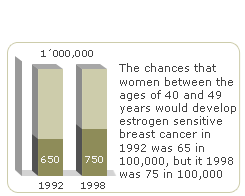34 MENOPAUSE SYMPTOMS |
HEALTH CENTER |
|
LEARN MORE |
|||||||||||||||||||||||||||||||||||||||||||||||
| Menopause | |||||||||||||||||||||||||||||||||||||||||||||||
| Symptoms | |||||||||||||||||||||||||||||||||||||||||||||||
| Herbs for Menopause | |||||||||||||||||||||||||||||||||||||||||||||||
|
|||||||||||||||||||||||||||||||||||||||||||||||
|
|||||||||||||||||||||||||||||||||||||||||||||||
|
|
Excessive Red Meat Intake Linked with Breast Cancer during Premenopause |
A recent investigation of Dr. Cho from the Department of Medicine, Brigham discovered that excessive intake of red meat might significantly raise a risk of certain types of breast cancer in women in premenopause. |
|
Red meat intake and breast cancer Researchers at Brigham and Women's Hospital (BWH), in which Dr. Cho led the investigation, studied the association between red meat intake and breast cancer in 90,659 women from 1991 through 2003 (when they had an average age of 36). It was required that these women in premenopause and had not previously had cancer to be included in this analysis. The participants filled out food questionnaires in three opportunities: 1991, 1995 and 1999 in order to give information about their diets and beverages daily routines, and whether or not they developed breast cancer during that period. "The overall risk of breast cancer in premenopause is low when we compared to getting the disease after the menopause. So even at the highest rates of meat consumption, this is overall still a relatively small increase," says Henry Scowcroft at Cancer Research UK. One of the hypotheses might be because women are consuming more foods that contain added hormones or hormone-like compounds than they used to in previous decades, Dr. Cho says. The hormones or hormone-like compounds in red meat may develop the growth of hormone-sensitive breast cancer by attaching to specific hormone receptors on the tumors, Cho suggests. On the other hand, researchers said the findings provide another motivation to limit consumption of red meat, which is already known to raise the risk of colon cancer. "So many risk factors for breast cancer are things that you can't alter" said Nancy E. Davidson, a breast cancer expert at Johns Hopkins University in Baltimore. "This represents something women could take charge of, something you can change to diminish your risk." |
|
Red meat ingestion increases the risk of breast cancer Why red meat might increase the risk for breast cancer is still unknown, but previous research has mentioned several possible reasons: substances produced by cooking meat may be carcinogenic, naturally occurring substances in meat may imitate the action of hormones, or growth hormones that farmers use to feed cows could fuel breast cancer in women who consume meat from the animals. Besides that, when the researchers analyzed the data from 1991 to 2003, they found no overall link between red meat ingestion and an increased risk of breast cancer. |
 |
But when they examined the data from only the 512 women who developed the type of breast cancer whose growth is fueled by the hormones estrogen and progesterone, they found an association. Do we have to remove red meat consumption from my regular diet? While it may be premature to make formal dietary recommendations based on the findings, it is so well respected that women should take this new analysis into consideration in order to avoid health issues such as a different kind of cancer related with the daily read meat intake. In this way, Cho adds that since red meat also contains saturated fat, "it's prudent for women to reduce their red meat intake for health purposes in general". By Natural-Progesterone-Estrogen-Supplements.com
Sources: "Red Meat Intake and Risk of Breast Cancer among Premenopausal Women" by Cho, Eunyoung in 2006. |
|
| Back to Home: | 34 Menopause Symptoms |  |
